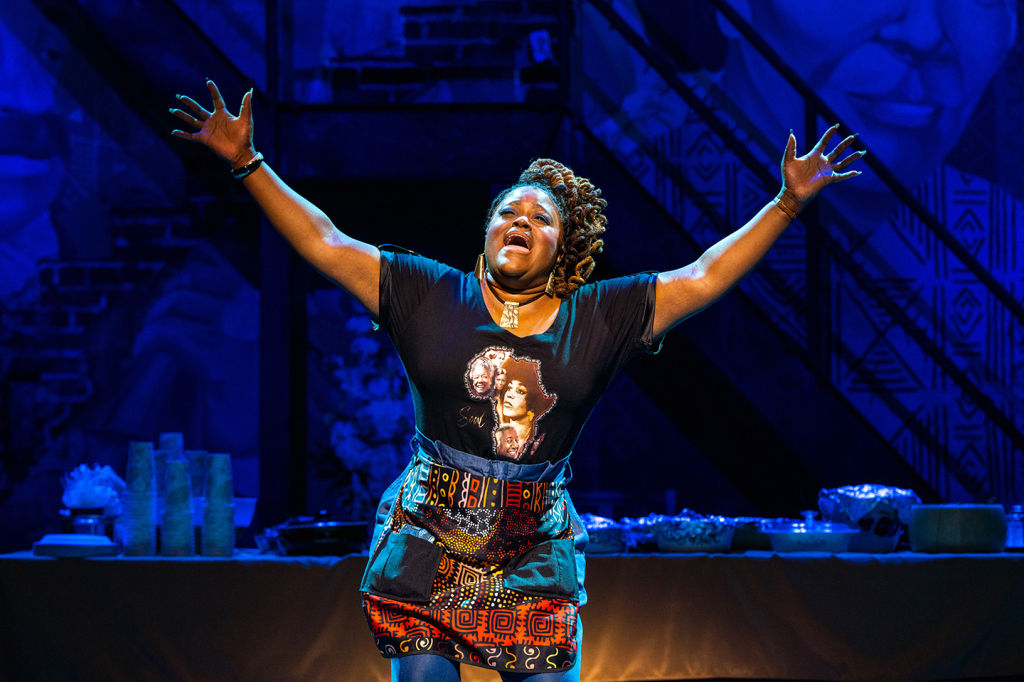Culture
 Nova Y. Payton as Ruthie in "Grace." Photo by André Chung.
Nova Y. Payton as Ruthie in "Grace." Photo by André Chung.
“Grace” How Sweet the Sound at Ford’s Theatre
March 23, 2022 @ 3:00pm
You can give grace, receive grace, say it, and fall from it. It can be good, bad, and saving. You can put on airs and graces, be in a state of grace, and offer a period of it. For such a flexible word, many of us could benefit from more of it. Fortunately, the new musical “Grace,” running at Ford’s Theatre through May 14, promises to explore the full breadth of the rich term.
Written by composer, producer, and son of D.C., Nolan Williams, Jr., and award-winning playwright and actress Nikkole Salter, “Grace” tells the story of the Minton family as they face the death of their matriarch, personal struggles, strained relationships and the forces of gentrification on their long-running Philadelphia restaurant. Through the Minton’s trials and a score inspired by jazz, R&B, and gospel, the musical serves up lessons in African American culinary history and traditions while also examining the present realities of Black-owned businesses.
While Minton’s story is fictional, historical fact inspired Williams.
“I’ve always been fascinated with W.E.B. Du Bois as an African American intellectual and his perspective on the plight of Black people in our country. Homing in on his references to the caterers in his book “The Philadelphia Negro (1899),” I realized his is documenting pioneers,” Williams says.
The ‘pioneers,’ a word Williams purposefully uses, are a group of Black men who established a monopoly on the catering business in Philadelphia over the early to mid-1800s. Many of them expanded into full-service restaurants, becoming “self-reliant, original businessmen, who amassed fortunes for themselves and won general respect for their people,” in Du Bois’ words.
“I based the story of the last chef Du Bois names, Henry Minton,” Williams explains. “This is a fictionalized family of Minton’s descendants, and I asked, ‘If the restaurant that he established more than one hundred years ago were still in existence, what would its plight be?’”
It’s a timely question.
“When we look at Black restaurants in urban centers all around the country, we see the challenges they face as neighborhoods are gentrifying, or already have gentrified,” Williams says. The writer points to the varying fates of U Street’s Ben’s Chili Bowl and H Street’s now-closed Horace & Dickie’s Seafood.
Like all productions, “Grace” requires a lot of ‘chefs’ to bring it off. Bona fide District diva Nova Y. Payton plays Ruthie, the chief cook and businesswoman fighting to keep her family’s restaurant open. The formidable soprano finds a lot in common with her character — both are mothers, both know the daily hustles of entrepreneurship and both can find asking for help hard. With everything Ruthie is going through, Payton explains, “she’s trying to save face, saying ‘Everything’s fine’ until it’s not, until she’s forced to say out loud, ‘I need help.’”
“You have cousins that bicker, the brother and sister who fight and nag all the time, even though they are adults, the distant cousin who feels like he’s out of place,” Payton lists in describing the Mintons.
By the end, though, she adds they learn “’We are family, and all we have is each other. No matter what’s happening, I’m going to be here for you. But you have to be able to speak up. You got to say when you need help.’”
Payton has stirred audiences’ emotions as some of musical theater’s most iconic characters: Effie White in Signature Theatre’s “Dreamgirls (2012)”; Caroline Thibodeaux in “Caroline, or Change (2016)” at Round House Theatre; Sarah in Ford’s “Ragtime” (2017); and most recently The Witch in “Into the Woods” in Austin, Texas.
“Grace” marks the first time she is originating a role, a process she finds exciting, particularly because she and Williams have worked together many times before.
“Nolan is an amazing songwriter and musician,” Payton says. “He’s very smart and knows how to write for voices. He hears you, and he’s like, ‘Okay, this is what I’m going to put on paper, but I trust that you can embellish on that in a smart way.’”
Williams also sings his collaborators’ praises, from Payton to his book-writing partner Nikkole Salter, to the production’s director, Robert Barry Fleming, the former director of artistic programming at Arena Stage and now the executive artistic director of the famed Actors Theatre of Louisville.
“Robert has been with me since the very beginning, before I even knew what this was,” Williams shares with obvious affection. “I went to him to say, ‘I’ve got these dozen or so songs. Can you listen and let me know if there’s anything here?’ He’s a brilliant director and choreographer.”
Payton and Williams both reminisce about their own families’ legacies of food, community, and love. Payton remembers her grandmother cooking enough food from scratch to feed a choir every Sunday, while Williams used to accompany his grandmother — affectionately called The Songbird of Texas — on piano in improvised concerts after family meals.
“The kitchen table was a place of amnesty,” Williams reflects. “It was a place where family history was shared, a place where we could talk pretty openly about things, even things that happened months or years previously, without fear of retribution.”
A place to share grace.
Ford’s Theatre is producing the world-premiere musical — the venerable company has produced over 35 new shows in the last 50 years — by a special arrangement with Dale A. Mott/Edgewood and NEWorks Productions.
For more information and tickets, visit here.
Ford’s Theatre: 511 10th St. NW, DC; fords.org // @fordstheatre
Enjoy this piece? Consider becoming a member for access to our premium digital content. Support local journalism and start your membership today.







